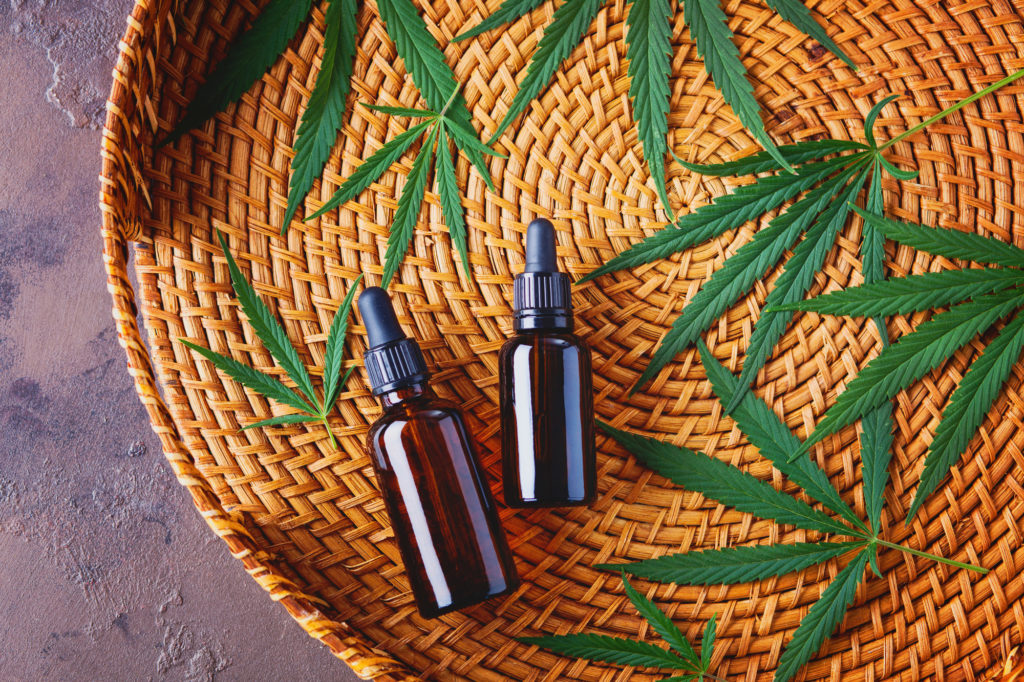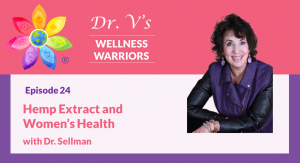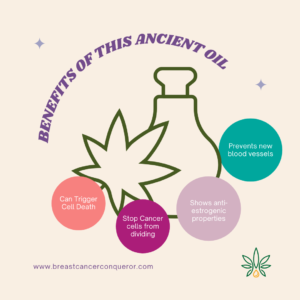
Its been quite a while since I have written about medical cannabis and its benefits for health in general and its effect on Breast Cancer. In just a few short years, a lot has changed. The biggest change has been how many states now allow cannabis to be used for medical purposes. According to the National Council of State Legislators, as of May 2021, 36 states and 4 territories have passed laws allowing for the medical use of cannabis products. Here is an update on how cannabis works, the benefits of CBD, and a basic look as well as some comments on a well-known formula called RSO, or Rick Simpson Oil.
Healing Substances in Cannabis
You’ve probably heard of the two main components of the cannabis plant: CBD (cannabidiol) and THC (tetrahydrocannabinol). There are two main kinds of cannabis: non-psychoactive varieties within the Cannabaceae family (i.e. cannabis Sativa), also known as hemp, and psychoactive varieties of Cannabis Sativa or Cannabis Indica. The psychoactive varieties are sometimes referred to as “marijuana”.
The big difference between the two is that hemp contains vastly smaller amounts of THC, the psychoactive substance within cannabis Sativa and cannabis Indica. The usual THC content of hemp is about .2%, which is too small to have any psychoactive effect whatsoever on most individuals.
As a side note, did you know that hemp is one of the fastest-growing plants on earth, second only to bamboo? It is also very durable and can be used not only to make healing oil but other products as well. Hemp was first spun into rope and other textiles thousands of years ago.
Entourage Effect
In addition to the different forms of CBD and THC found in cannabis, there are also dozens of other phytonutrients within it. This makes it an incredible superfood when consumed raw. Some of the other healing substances found in cannabis include terpenes such as limonene and myrcene (both known to be cancer-protective) as well as dozens of vitamins and minerals.
In total, there are potentially well over a hundred different healing phytonutrients in a single cannabis leaf. All of these substances work in a synergistic way known as the entourage effect.

The entourage effect was first discovered in the 1990s by cannabis researcher Dr. Ralph Mechoulam, a professor of Medicinal Chemistry at Jerusalem’s Hebrew University. In the 1980s, Mechoulam was the first to notice endogenous endocannabinoids in the body as well as cellular receptor sites for cannabinoids. These receptor sites are what THC in cannabis plugs into for healing. The entire process of “THC-cannabinoid receptor binding” as well as the healing effects that this creates is what is known as the Endocannabinoid System.
Although the entourage effect is mainly used to describe the synergy between substances in cannabis, you can actually see a type of “entourage effect” occurring in many whole foods. That is why it is often better to consume nutrients in whole foods form as part of a well-rounded, organic diet as opposed to supplements whenever possible. This goes for whole-plant or full-spectrum cannabis products as well!
CBD for Health
That being said, many studies have shown non-psychoactive CBD extracted from either hemp or marijuana to be greatly beneficial for many conditions including cancer.
This is good news if you live in a region where medical marijuana is unavailable. In these states, you can still purchase hemp-based CBD products legally. Just be sure to get it from a reliable, all-organic source. It takes a larger quantity of hemp and more complicated measures to extract and manufacture CBD oil as it does from other forms of cannabis. Less-than-trustworthy companies may skirt safety procedures and turn to harsh (but cheap) chemicals for manufacturing.
CBD for Breast Cancer
The really good news is that there is clear evidence that CBD can work for reducing Breast Cancer tumors as well. Well-known cannabis researcher Dr. Cristina Sanchez has done some great research in this regard.
A 2012 study conducted by Sanchez and her team at Complutense University in Madrid, Spain found that CBD, in particular, was able to instigate apoptosis (or cancer cell death). It also prevented new blood vessels from growing, inhibited metastasis, and even prevented cancer cells from dividing.
Other experiments have shown that the positive effects of CBD may also take place with highly aggressive tumor cells as well.
 CBD can be a valuable tool in your toolbox for healing, whether you have Breast Cancer or you want to prevent it. Other studies show that CBD can help with some symptoms, such as pain and nausea, associated with traditional cancer therapies. And, according to a 2005 Korean study, CBD has also proven to have similar anti-estrogenic properties, without all the side effects.
CBD can be a valuable tool in your toolbox for healing, whether you have Breast Cancer or you want to prevent it. Other studies show that CBD can help with some symptoms, such as pain and nausea, associated with traditional cancer therapies. And, according to a 2005 Korean study, CBD has also proven to have similar anti-estrogenic properties, without all the side effects.
I have used hemp-based CBD for years as part of my healing protocols and I feel that it has benefited me greatly.
THC and Cancer
Science has also shown that there are definite advantages for some conditions in using higher THC-based cannabis Sativa modalities (for individuals who are not THC-sensitive). This means certain kinds of cancers as well.
A 2007 investigation conducted by researchers at Harvard Medical School’s Beth Israel Deaconess Medical Center found that THC was a major contributor to tumor cell inhibition in mice with lung cancer.
The best cancer-busting ability when it comes to cannabis, however, appears to occur when THC and CBD work together. In the Harvard study, the researchers hypothesize that the success of cannabis against lung cancer had to do with the way that THC was able to influence CB1 and CB2 cannabinoid receptors within the cancer cells themselves. This is an example of the entourage effect hard at work.
Rick Simpson Oil, Yes or No?
Even though there are proven benefits to consuming THC-based cannabis when it comes to some cancers and other conditions, as you swim through the sea of cannabis-based modalities and protocols, be sure to use discernment and common sense.
We’ve all seen the ads for the “miraculous” formula called Rick Simpson Oil. They are everywhere on the internet “Rick Simpson Oil On Sale Now!” and “All You Ever Need to Know About RSO” advertisements often crowd up our comment boards as well!
So what is Rick Simpson Oil, or “RSO,” and does it have any validity for helping with cancer? RSO was first created by engineer Rick Simpson who lived in Canada in the late 1990s. After having a severe accident, Simpson started suffering from severe dizziness. Traditional medications did not work. After watching a documentary on the subject, he decided to give cannabis a try.
Simpson noticed significant improvements in his condition with medical marijuana. When he developed basal cell carcinoma on his arm, he decided to try cannabis for that as well. He applied high-THC cannabis oil topical to his arm for four days. He was shocked to find that the carcinoma bumps had disappeared after just a short time.
After that, Simpson was motivated to help others. He soon began cultivating his plants and eventually created his formula (now known as RSO). As the story goes, he often gave the formula away for free. In the face of ongoing persecution, it is said that he helped over 5,000 people to heal through cannabis.
RSO differs from other cannabis formulas in that it is extracted from strains that contain very high levels of THC and little CBD. There are quite a few studies that connect high-THC Cannabis Indica and Sativa strains to help with cancer. As I stated earlier, however, more success appears to occur with strains that contain a 1:1 ratio of THC and CBD. A 2008 study published in the British Journal of Pharmacology found that CBD can lower THC’s psychoactive effect in the body, while not affecting THC’s proven healing and cancer-busting characteristics.
Should You Use Cannabis for Cancer?
More to the point, what form of cannabis should you use once you decide to give it a go? The answer to that question, of course, totally depends on your health situation and goals. We know from research that all formulations of cannabis — from almost all CBD to almost all THC– will work for some people and some forms of cancer and other conditions. My suggestion is to get guidance from a natural health practitioner who is versed in cannabinoid therapy if you are inspired to use it as one of your modalities for healing and preventing Breast Cancer.
A great resource to get you started is at United Patients Group online. This consumer advocacy organization has a publicly accessible database of cannabis research and is dedicated to educating patients as well as practitioners.
You can schedule a consultation with one of their knowledgeable counselors. They can get you started on your own path towards finding the right cannabis formula for you.
And if you want to try hemp-based CBD oil, which has been my go-to for years, I recommend a company called Optivida. You can look at what they have to offer HERE.
